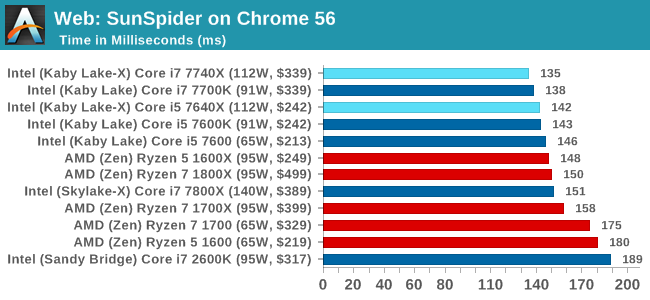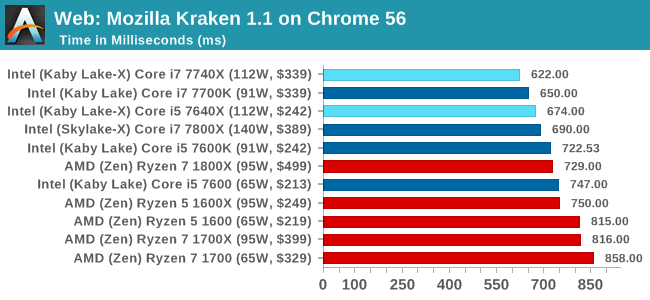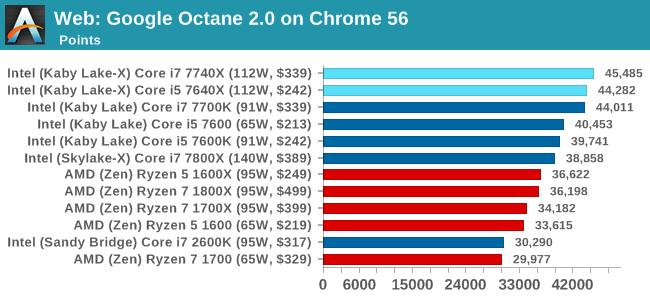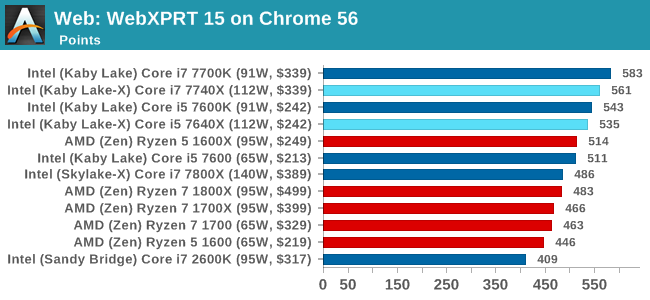The Intel Kaby Lake-X i7 7740X and i5 7640X Review: The New Single-Threaded Champion, OC to 5GHz
by Ian Cutress on July 24, 2017 8:30 AM EST- Posted in
- CPUs
- Intel
- Kaby Lake
- X299
- Basin Falls
- Kaby Lake-X
- i7-7740X
- i5-7640X
Benchmarking Performance: CPU Web Tests
One of the issues when running web-based tests is the nature of modern browsers to automatically install updates. This means any sustained period of benchmarking will invariably fall foul of the 'it's updated beyond the state of comparison' rule, especially when browsers will update if you give them half a second to think about it. Despite this, we were able to find a series of commands to create an un-updatable version of Chrome 56 for our 2017 test suite. While this means we might not be on the bleeding edge of the latest browser, it makes the scores between CPUs comparable.
All of our benchmark results can also be found in our benchmark engine, Bench.
SunSpider 1.0.2: link
The oldest web-based benchmark in this portion of our test is SunSpider. This is a very basic javascript algorithm tool, and ends up being more a measure of IPC and latency than anything else, with most high-performance CPUs scoring around about the same. The basic test is looped 10 times and the average taken. We run the basic test 4 times.

SunSpider has a single threaded focus, and we see the Kaby Lake-X processors take their spots at the top of the graph.
Mozilla Kraken 1.1: link
Kraken is another Javascript based benchmark, using the same test harness as SunSpider, but focusing on more stringent real-world use cases and libraries, such as audio processing and image filters. Again, the basic test is looped ten times, and we run the basic test four times.

Mozilla too relies on single threaded IPC and frequency.
Google Octane 2.0: link
Along with Mozilla, as Google is a major browser developer, having peak JS performance is typically a critical asset when comparing against the other OS developers. In the same way that SunSpider is a very early JS benchmark, and Kraken is a bit newer, Octane aims to be more relevant to real workloads, especially in power constrained devices such as smartphones and tablets.

Octane is an interesting benchmark, requiring cores and ST performance, but mostly the latter. It also seems that either Intel's design is optimized for the benchmark or vice versa, given the substantial difference in performance. There's no way for the benchmark to use all of the threads from AMD, nor the 12 threads in the Core i7-7800X which has a lower single thread performance.
WebXPRT 2015: link
While the previous three benchmarks do calculations in the background and represent a score, WebXPRT is designed to be a better interpretation of visual workloads that a professional user might have, such as browser based applications, graphing, image editing, sort/analysis, scientific analysis and financial tools.

WebXPRT is a mix of ST and MT, but still based in the web and relies on ST performance a lot. Given the variable loading on the benchmark, Intel's newest features such as Speed Shift help keep it at the top.










176 Comments
View All Comments
Gulagula - Wednesday, July 26, 2017 - link
Can anyone explain to me how the 7600k and in some cases the 7600 beating the 7700k almost consistenly. I don't doubt the Ryzen results but the Intel side of results confuses the heck out of me.Ian Cutress - Wednesday, July 26, 2017 - link
Sustained turbo, temperatures, quality of chips from binning (a good 7600 chip will turbo much longer than a 7600K will), time of day (air temperature is sometimes a pain - air conditioning doesn't really exist in the UK, especially in an old flat in London), speed shift response, uncore response, data locality (how often does the system stall, how long does it take to get the data), how clever the prefetchers are, how a motherboard BIOS ramps up and down the turbos or how accurate its thermal sensors are (I try and keep the boards constant for a full generation because of this). If it's only small margin between the data, there's not much to discuss.Funyim - Thursday, August 10, 2017 - link
Are you absolutely sure your 7700k isn't broken? It sure looks like it is. I understand your point about margins but numbers are numbers and yours look wrong. No other benchmarks I've seen to date aligns with your findings. And please for the love of god ammend this article if it is.Hurr Durr - Monday, July 24, 2017 - link
One wonders why would you relegate yourself to subpar performance of AMD processors.Alistair - Tuesday, July 25, 2017 - link
Your constant refrain belonged in the bulldozer era (when the single threaded performance difference was on the order of 80-100 percent). Apparently you can't move past the Ryzen launch. If a different company such as Samsung had launched these CPUs the reception would have been very different. I've never bought AMD before but my Ryzen 1700 is incredible for its price, and I had to be disillusioned by my terrible Skylake upgrade first before I was willing to purchase from AMD.Gothmoth - Tuesday, July 25, 2017 - link
don´t argue with trolls....StevoLincolnite - Tuesday, July 25, 2017 - link
Why would Intel enable HT when they could sell it as DLC?https://www.engadget.com/2010/09/18/intel-wants-to...
coolhardware - Tuesday, July 25, 2017 - link
Glad to hear that the benchmarking is (becoming) less of a chore :-) Kudos and thank you for the great article!fallaha56 - Tuesday, July 25, 2017 - link
Surely that AVX drop -10 when overclocking was too much?What about delidding?
Samus - Monday, July 24, 2017 - link
It still stands that the best value in this group is the Ryzen 1600X, mostly because it's platform cost is 1/3rd that of Intel's HEDT. So unless you need those platform advantages (PCIe, which even x299 doesn't completely have on these KBL-X CPU's) it really won't justify spending $300 more on a system, even if single threaded performance is 15-20% better.Just the fact an AMD system of less than half the cost can ice a high end Intel system in WinRAR speaks a lot to AMD's credibility here.